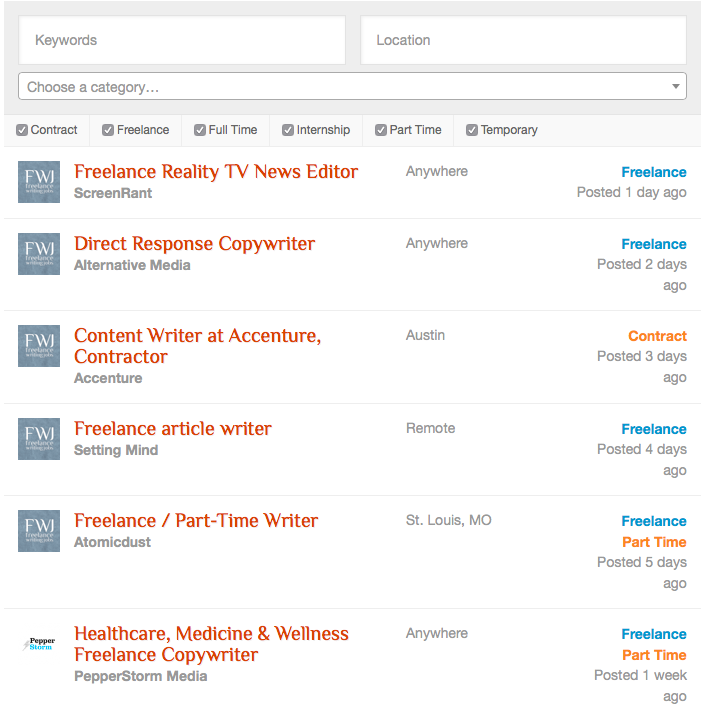If you’ve ever read any article anywhere on the internet about “how to work online” or about side hustles for earning extra cash, freelance writing is usually a top pick. But, how do you actually start freelance writing with no experience? With some diligent work and the tips, I’m going to offer, becoming a freelance writer is a viable option for a flexible, scalable, and good paying full-time job.
But first, let me introduce myself and tell you why I know what I’m talking about.
I’m Ariel, a staff writer and editor for Laptop Empires. I started freelancing a little over three years ago after my sister-in-law, Michelle of Making Sense of Cents, approached me about doing some copyediting for her blog. I had been mostly staying at home with my kids and working a number of low paying part-time jobs. Editing allowed me to earn around $300 extra each month.
One day I pitched Michelle an idea for a post. She accepted, and I got my first ever freelance writing job. You can find that post here: Editing and Writing Strategies That Will Take Your Blog to the Next Level.
My work started to snowball, and last year I made the leap from part-time freelance work to working full-time as a freelance writer and editor. I’ve had guest posts on Making Sense of Cents, Millennial Money Man, now Laptop Empires, and several other sites. It kind of feels like I’m part of one big happy blog family these days.
What I love about freelance writing is this…
My job is super flexible. I have three kids and can be available for them when they need me, plus I get to spend the summer traveling with my family knowing that I now have a pretty steady paycheck coming in. Plus, I get to be my own kind of boss.
I’m actually using my English degree, although it’s not at all necessary for freelance writing – it’s just a perk that makes me feel like I got my money’s worth.
I work with clients, companies, and nonprofits that I believe in. I get to help them share their messages. Exactly what I’m doing today!
I’m earning a pretty decent living. That initial $300 each month has increased to a full-time income and continues to grow. My business now encompasses a variety of freelance services – editing, writing, content creation, and coaching services. It’s just really empowering to know that I’m making a major financial contribution to my family.
If you’re wondering how to start freelance writing with no experience, like where I began, then read on.
But first, what exactly is freelance writing?
Here’s the gist of it: you write articles, blog posts, emails, and/or copy for a number of different types of clients. Here are a few examples of the types of freelance writing jobs I’ve done:
- Freelanced for a marketing agency that had me write the copy describing high-end jewelry. It was basic stuff like, “Slip this sparkling diamond band onto her finger as you say your vows…”
- Worked on comms (emails) for a business owner who says he just doesn’t write well but needs to communicate effectively with his clients.
- Written the introductions to several books of poetry.
- A number of blog posts, like this, this, and this.
Those aren’t the hard-hitting news stories or high-brow cultural writing you might be wanting because freelance writing starts small and grows with experience.
Speaking of experience, you don’t need formal training or impeccable grammar (even I outsource editing from time to time). You create your experience through the options I’m about to give you.
It is helpful if you are naturally a good writer, in the sense that you can get a point across in a linear fashion, can tell a story, and genuinely enjoy writing. But a lot of that comes through practice, which brings me to what you came for.
How to start freelancing writing with no experience
1. Start a blog
For the purpose of learning how to become a freelance writer, starting a blog has several benefits. The first is that starting a blog is a place to find your voice as a writer. You can play around with your style as you write about things you love.
Writing is a practice that takes daily or weekly work to perfect, and most of us probably haven’t done much of it since college or high school.
Your blog also acts as a portfolio. When you get to the point that you’re approaching clients, they may want to see what you can do. What clients are looking for is the ability to flesh out ideas and write in a cohesive and engaging way. Honestly, you can blog about anything you want. I will put one caveat on that – if you’re writing stuff that’s offensive, it’ll probably turn potential clients off.
Blogging also builds your stamina. You’ll need that when you’re researching, writing, and working under a deadline. Think back to school for a second. How long did it take you to write a 2,000-word essay? What about a paper that got you an A on? Could you write 5+ of those per week?
And, if you decide to optimize your blog, monetize it, or pay for traffic, then blogging can turn into your full-time job. It can lead to affiliate income and selling your own products. That’s next level stuff and not what happens to most freelance writers at first, but it is a possibility. So again, take it seriously. I cannot stress that enough.
If you’re interested in starting a blog but are hung up on the whole installation and set-up process, Launch That Blog is a free service that takes care of those details. All you need to do is start a WordPress blog and host it through Bluehost (the $2.95 per month option is the best choice).
2. Look for writing jobs on content mills
Content mills are middlemen between clients and freelance writers. While it’s not high-paying work, it’s a great place to look when you’re starting to freelance write without any experience.
The way content mills work is that companies list writing jobs on these platforms. You then take a job, and get paid. Easy enough, right? What you gain here is some starting cash, even though it can be as little as $0.01 per word.
Bigger than that, you grow your confidence as a writer and learn how to work under a deadline and with editors. We can be pretty nitpicky at times, and it can sometimes be a love/hate relationship.
Here are a few sites to look at to start getting paid for freelance writing:
To fully understand what content mills are, visualize a mill – quickly and efficiently churning out content. I’m not trying to dog on this type of work, because it’s important and beneficial when you’re starting. Plus, some jobs do come with bylines, but efficiency is key if you’re trying to maximize your earnings. Again, this is why building your stamina is going to help.
3. Use freelance marketplaces
Websites like Upwork, Fiverr, and Freelancer are online platforms that clients and individuals use to find freelance writers. These sites are similar to content mills, but they have a more personal feel because you create a profile and get ratings as you work more. These gigs often pay more, too.
Here’s what listings on Upwork look like:

4. Keep an eye on job boards
Depending on your goal, this is where things start to get a little more serious for freelance writers. Job boards post higher paying jobs for professional freelance writers. They’re considered professional because you will need a resume, samples of your work, and/or a website that puts all of that in one tidy place.
This is working your way up the ladder, and why #1, #2, and #3 are steps towards how you start freelance writing with no experience. You’re growing in those steps, and moving towards something bigger, aka higher-paying jobs.
Freelancing writing job boards list both freelance and contract work for full and part-time jobs. You can also find remote or location-based writing jobs. There are several job boards for freelance writers, and Freelance Writing Jobs is one of the best.

5. Start guest posting
Writing posts for other blogs is an awesome way to grow your freelance writing business, especially if your end goal is to become a full-time blogger. And if that’s not your goal, guest posting allows you to work with bloggers you admire and can actually grow your online business.
This is really how I got my first big freelance writing break. The first guest post I ever wrote has a link to my website, and it continues to generate business for me on a regular basis.
Guest posting usually starts with your blog, and then you network with other bloggers in your niche. Your comment on their posts, interact with them via social media, and share their links. Once you’ve developed a good relationship that offers them value – you’re not starting here with self-promotion – you can try pitching them a guest post.
Guest posting is a two-way street. They share, you share. And while it’s not always a direct monetary gain, it will increase your visibility.
6. Submit your ideas to larger websites
Once you’ve got a good portfolio going (again, a blog or website is one of the best places to show your work), then you can start contacting larger websites and pitching your ideas.
If you’ve found that you’re doing a lot of writing about outdoor sports and activities and enjoy it, pitch an article to Backpacker or Outside. Writing a lot about cooking? Pitch something to The Kitchin or Eating Well.
You’re probably already reading what’s on the sites you’d be pitching, but go one step farther and Google the name of the site + something like “style guide” or search “criteria for writing for ____.”
Even though you know the type of content these sites are looking for, knowing how they like their articles formatted and written will give you an edge. This includes stuff like using AP or Chicago Style, article length, etc.
There are different types of writing jobs and expectations for both print and online publications. For example, not all writers labeled as “contributors” are actually paid for their work. Those types of positions can give you exposure and increase traffic to your site. The paying jobs can be lucrative, but it’s incredibly competitive, which is why everything else I’ve listed is so important when you’re learning how to become a freelance writer.
My final word on how to start freelance writing with no experience
When it comes to freelance writing, I’d say that everyone really does have some experience. Even those essays you wrote in high school about Catcher in the Rye count. If you’ve gone to college, you might have even more experience – tougher editors (professors and peers), more in-depth research, and maybe it sparked something.
I’ve actually always wanted to be a writer. I love telling stories. I love teaching people. I love how writing grows empathy.
Not all jobs hit those buttons. Describing wedding bands doesn’t really do it for me, but it’s still engaging people and imparting a message.
And while your goals might be different than someone else’s, all freelance writers start without any official working experience. All it takes is one job. Then you’re there. Congrats!
You can find me over here at arielgardnerediting.com.


Leave a Reply